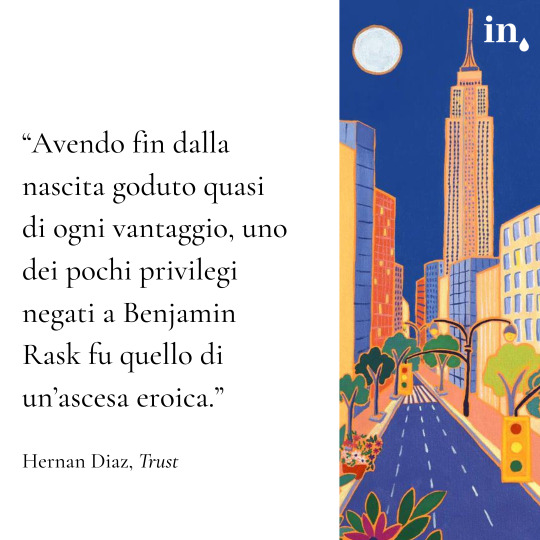#hernan diaz
Text
Because he had enjoyed almost every advantage since birth, one of the few privileges denied to Benjamin Rask was that of a heroic rise: his was not a story of resilience and perseverance or the tale of an unbreakable will forging a golden destiny for itself out of little more than dross.
Trust, Hernan Diaz
#that is an opening#first lines#trust#hernan diaz#book quotes#adultbooklr#adultbooklrquotes#currently reading
45 notes
·
View notes
Text
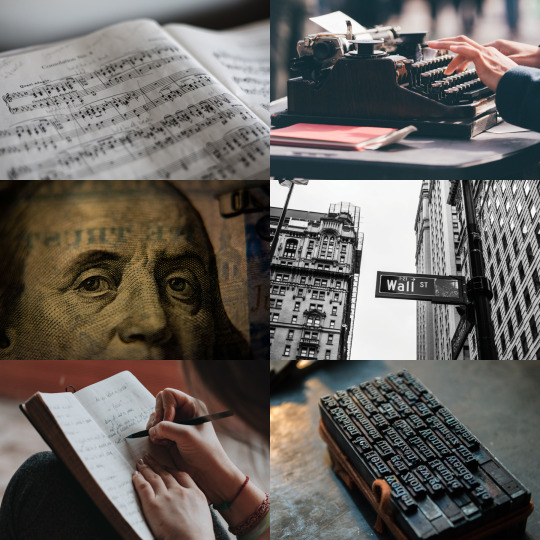
books cristina read in 2023: trust - hernan diaz
“Nothing more private than pain. It can only involve one. But who? Who is “I” in “I hurt”? The one who inflicts the pain or the one who suffers it? And does “hurt” refer to the inflicting or the suffering?”
13 notes
·
View notes
Text
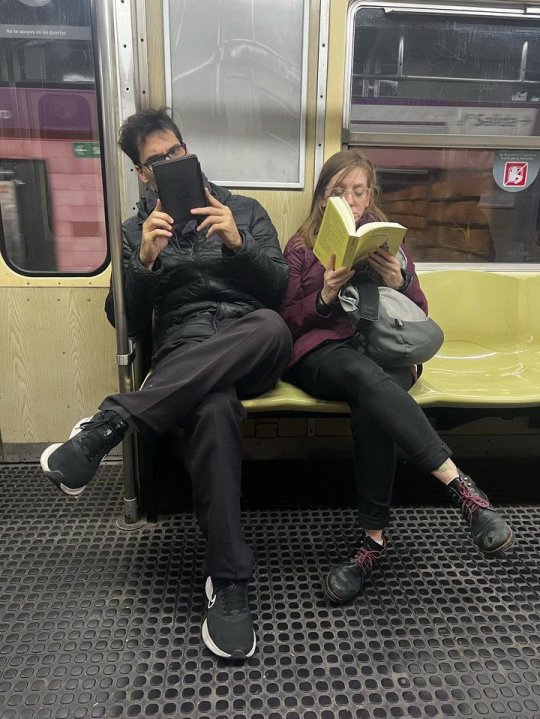
“Fortuna”, de Hernán Diaz
#trust#fortuna#hernan diaz#anagrama#libros#premio pullitzer#pullitzer#leyendo#autores#escritores#bookgasm#bookgram#books with me#argentina#subte#linea E#emova#subway#books & coffee#girls reading#women reading#leo y comparto#leo y recomiendo#book rewiew#book review#bookstagramarg#bookstagram#booklovers#buenos aires#more books please
11 notes
·
View notes
Text
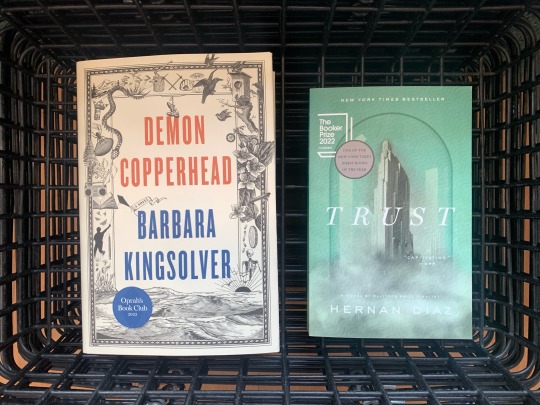
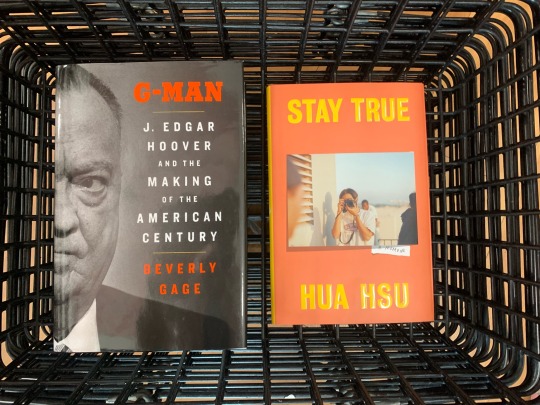

The Pulitzer Prize winners were announced yesterday, amazingly there were two novels chosen for the award for fiction.
Pulitzer Awards for Books, Drama and Music
Fiction
"Demon Copperhead," by Barbara Kingsolver (Harper)
"Trust," by Hernan Diaz (Riverhead Books)
Finalist:
"The Immortal King Rao," by Vauhini Vara (W. W. Norton & Company)
Drama
"English," by Sanaz Toossi
Finalists:
"On Sugarland," by Aleshea Harris
"The Far Country," by Lloyd Suh
History
"Freedom’s Dominion: A Saga of White Resistance to Federal Power," by Jefferson Cowie (Basic Books)
Finalists:
"Seeing Red: Indigenous Land, American Expansion, and the Political Economy of Plunder in North America," by Michael John Witgen (Omohundro Institute of Early American History and Culture/University of North Carolina Press)
"Watergate: A New History," by Garrett M. Graff (Avid Reader Press/Simon & Schuster)
Biography
"G-Man: J. Edgar Hoover and the Making of the American Century," by Beverly Gage (Viking)
Finalists:
"His Name is George Floyd," by Robert Samuels and Toluse Olorunnipa (Viking)
"Mr. B: George Balanchine’s 20th Century," by Jennifer Homans (Random House)
Memoir or Autobiography
"Stay True," by Hua Hsu (Doubleday)
Finalists:
"Easy Beauty: A Memoir," by Chloé Cooper Jones (Avid Reader Press/Simon & Schuster)
"The Man Who Could Move Clouds: A Memoir," by Ingrid Rojas Contreras (Doubleday)
Poetry
"Then the War: And Selected Poems, 2007-2020," by Carl Phillips (Farrar, Straus and Giroux)
Finalists:
"Blood Snow," by dg nanouk okpik (Wave Books)
"Still Life," by the late Jay Hopler (McSweeney’s)
General Nonfiction
"His Name is George Floyd," by Robert Samuels and Toluse Olorunnipa (Viking)
Finalists:
"Kingdom of Characters: The Language Revolution That Made China Modern," by Jing Tsu (Riverhead Books)
"Sounds Wild and Broken: Sonic Marvels, Evolution’s Creativity, and the Crisis of Sensory Extinction," by David George Haskell (Viking)
"Under the Skin: The Hidden Toll of Racism on American Lives and on the Health of Our Nation," by Linda Villarosa (Doubleday)
Music
"Omar," by Rhiannon Giddens and Michael Abels
Finalists:
"Monochromatic Light (Afterlife)," by Tyshawn Sorey
"Perspective," by Jerrilynn Patton
#pulitzer prize#books#award winners#barbara kingsolver#demon copperhead#trust#hernan diaz#harper books#riverhead books#g-man#beverly gage#stay true#hua hsu#his name is george floyd#robert samuels#toluse olorunnipa#viking books#doubleday books
14 notes
·
View notes
Text
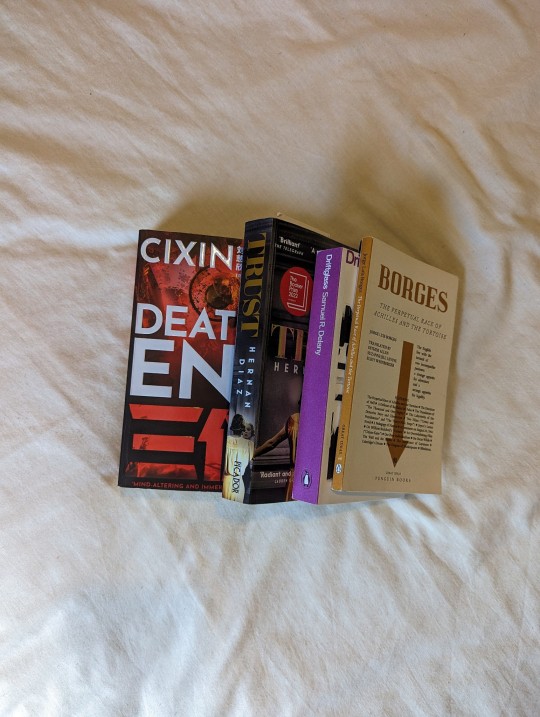

currently stressing all my friends out with how many books I read at the same time
#cixin liu#hernan diaz#samuel r delany#jorge luis borges#peter frankopan#booklr#bookblr#currently reading#book aesthetic
16 notes
·
View notes
Text
Most of us prefer to believe we are the active subjects of our victories but only the passive objects of our defeats. We triumph, but it is not really we who fail - we are ruined by forces beyond our control.
Hernan Diaz, Trust
15 notes
·
View notes
Text
Trust Book Review

Trust by Hernan Diaz Book Review
In keeping with tradition, I have once again read a book that I wouldn’t normally due to my boyfriend’s family’s annual Thanksgiving book club. Last year, we read The Personal Librarian by Marie Benedict and Victoria Christopher Murray. I found it lacking in characterization and wanted to like it more than I did.
This year’s book is Pulitzer Prize winner Trust by Hernan Diaz. Once again, I find myself inexplicably reading another book set in New York and revolving heavily around finances (a subject I could care less about).
Trust starts off by telling the story of a high-brow New York couple. As characters, they are both terrible. The novel spends an inordinate amount of time with Helen’s backstory, describing her manipulative and attention-seeking mother and her crackpot father who continually regresses into his convoluted dogmas.
Helen eventually marries finance mogul Benjamin Rask whose apathy allows him to completely focus on finance and nothing else.
As a couple, they come to an arrangement where Benjamin can focus on his Wall Street deals while Helen’s world revolves around music, the arts, and philanthropy.
This all starts to go downhill when Helen slowly starts losing her mind, eventually leading her to a Swiss sanatorium (the same one her father died in). Here she undergoes experimental electroshock therapy approved by her husband that leads to her painful and sudden death.
As soon as you’re left gaping and finally hooked as a reader, Diaz switches the narrative on you completely and suddenly you find yourself reading a half-completed biography for someone named Andrew Bevel. The shift is confusing and unwelcome.
It took me over 100 pages to get invested in the Rasks and their life only for it to be whisked away. Additionally, Bevel’s biography is banal. Filled with copious amounts of history, name-dropping, and financial advice, I found myself drowning in boredom.
Just when I thought I couldn’t take anymore, the narrative shifts once again, this time to the most interesting story. The memoir by Ida Partenza was the savior of this book for me. It clarified that the original story, the many chapters on the Rasks, was actually a “book” by author Harold Vanner on a real life couple named Andrew and Mildred Bevel.
Bevel, a living, breathing money mogul, is disgusted by Vanner’s fictionalized rendition of him and his wife and tasks young Ida Partenza to write his biography, the second section of the book by Diaz we had read previously.
The memoir by Ida goes back in forth in time itself, with the young Ida interviewing, meeting Bevel, being chosen to write his biography, and leisurely coming to idolize him, all in contrast with future 70-year-old Ida who is looking back on her life, her choices, and the influence Bevel made on her while reading through Mildred’s files.
I honestly wish the entire book had just been Ida’s memoir. It was by far the most interesting and most lucid part of the novel, tying everything else together and contrasting time periods within the narrative itself.
Lastly, the fourth and final narrative switch comes in the form of Mildred Bevel’s diaries, depicting not the end of her life due to mental illness, but due to cancer.
Her diary entries range from abstract and philosophical to more poignant reflections on her life and her relationship with Andrew.
It was a fascinating way to end the novel as a big question throughout the entire story—and the mystery plaguing Ida—is what truly happened to Mildred and who she really was as a person.
Trust turns out to be a meta-fictional story with shifting POV’s and unreliable narrators. While the beginning was a tedious slog, the ending with Ida and Mildred’s journals made this end positively for me.
I liked the puzzle of a story immersed in another story and I think reading a book about a couple and then reading about that couple is tricky to write and captivating to see unravel.
A part of me understands that this complex meta-narrative is why Diaz won the Pulitzer Prize. However, another, larger part of me still thinks that even though the ending was twisty and clever, the beginning was so droll that it’s unbelievable to me that he won anything at all.
A strange observation I made while reading was how little dialogue there is in Diaz’s novel. You get close to none of it until Ida’s memoir (another reason it’s the best section), which is mind-blowing.
Everyone knows that dialogue moves the story along, provides characterization, and is intriguing to read about. Having close to zero dialogue until nearly 300 pages in is ludicrous in my opinion.
The beginning pages of Trust are so incredibly difficult to get through (which I understand might be the point if the book was supposed to be bad), but the book was supposedly a bestseller in the meta universe of the day!
It makes no sense to me unless that’s how novels were written in the 1920’s New York society circles (which also doesn’t seem to add up), so none of it makes it an appealing read to someone ingesting it in 2023.
Additionally, as a writer myself I’ve been taught to try and capture your reader early on, to get them hooked on your story and your characters. Diaz did the opposite.
His beginning was so slow and his characters so mundane that it was an active turn-off for most of the experience until the very end.
I applaud his ending, his enveloping storylines, and his untrustworthy narrators, but the
beginning still haunted me all the way until the end. I fully admit that I’m biased towards YA and the things I enjoy, mainly good characters and interesting worlds, but excellent protagonists and charming settings don’t have (and shouldn’t be) the domain of YA alone.
It should be the goal of every good book, especially a Pulitzer Prize winner, to have all of the things that make Trust great in addition to characters I come to love, a world I can immerse myself in, and action that takes my breath away.
Recommendation: Every time I read an adult novel, especially one chosen for something as prestigious as the Pulitzer Prize, it makes me realize why I appreciate young adult literature and how difficult it is to actually interweave action, dialogue, characterization, and plot while still maintaining the reader’s interest.
It’s an incredibly challenging thing to write and accomplish, something most YA writers learn to perfect.
While Diaz’s novel might have won the Pulitzer Prize, and he crafted an interesting meta-story by the end with interlacing plot points and narratives, his lack of dialogue, trite characters, and chunks and chunks of dry writing made most of this book a chore to get through rather than an award-winning delight for me.
Score: 6/10
#trust#hernan diaz#book blog#book review#book recommendations#book rec#popular fiction#books#popular books#top books#favorite books#book recs#pulitzer prize#meta fiction#unreliable narrators#6/10
2 notes
·
View notes
Text
The terrifying freedom of knowing that nothing, from now on, will become a memory
— Hernan Diaz, Trust.
#gedankengespinste#trust#hernan diaz#quote#i actually do not want to tag this properly because it is not a good quote out fo context#but i need to find it again in the future
4 notes
·
View notes
Text
God is the most uninteresting answer to the most interesting questions.
Hernan Diaz, Trust
#hernan diaz#trust#book bucket list#quote#quotes#lit quote#lit quotes#literary quote#literary quotes#book
6 notes
·
View notes
Text
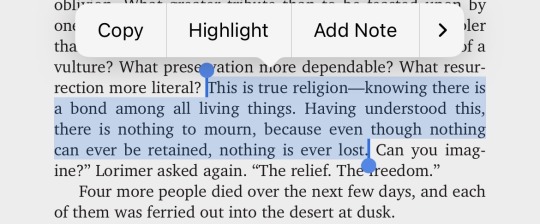
In the Distance // Hernan Diaz
1 note
·
View note
Text

Saturday indulgences
[Image ID: a weathered, wooden sidewalk table with Hernan Diaz' Trust and a caffe latte]
18 notes
·
View notes
Text
Kitsch. Can't think of the Engl. trans. for this word. A copy that's so proud of how close it comes to the original that it believes there's more worth in this closeness than in originality itself. "It looks just like ...!" Imposture over feeling actual emotion; sentimentality over sentiment. Kitsch can also be in the eye: "The sunset looks like a painting!" Because artifice is now the ultimate standard, the original (sunset) has to be turned into a fake (painting), so that the latter may provide the measure of the former's beauty. Kitsch is always a form of inverted Platonism, prizing imitation over archetype. And in every case, it's related to an inflation of aesthetic value, as seen in the worst kind of kitsch: "classy" kitsch. Solemn, ornamental, grand. Ostentatiously, arrogantly announcing its divorce from authenticity.
- Hernan Diaz, "TRUST"
2 notes
·
View notes
Quote
During my tests and interviews at Bevel Investments I first learned something I had the chance to corroborate many times throughout my life: the closer one is to a source of power, the quieter it gets.
Trust, Hernan Diaz
10 notes
·
View notes
Text
Nothing more private than pain. It can only involve one.
Trust by Hernan Diaz
4 notes
·
View notes

